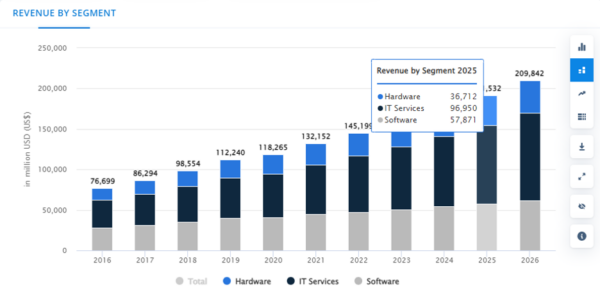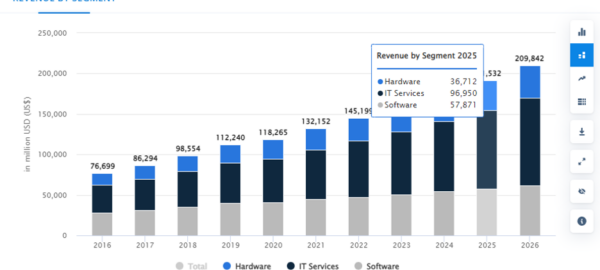While the chaos unleashed by the pandemic has caused great devastation worldwide, it’s also led to some revolutionary business advancements.
When businesses of all shapes and sizes had to quickly pivot during heavy lockdown restrictions, something great happened — a silver lining of sorts.
Unfortunately, we had to watch some businesses face devastating losses that led to them closing their doors. But we also got to bear witness to something special happening among the surviving businesses.
That was the willingness to do whatever it took to succeed, the willingness to claw out of despair and into creative solutions needed to solve new problems.
This includes solutions like moving to hybrid or fully remote work environments, keeping up with changing customer demands, or automating mundane tasks that were a leach on company time.
If the companies that have pivoted successfully have taught us anything, it’s that tenacity, agility, and a willingness to keep up with change are the three ingredients needed to pandemic-proof any industry. And one of the main tools they used to hold fast to their tenacity, agility, and willingness to change? Technology.
With that in mind, let’s look at how technology impacts the future of some industries and creates new opportunities for businesses.
Types of startups entrepreneurs are creating to fulfill new customer demands
Both the business-to-business (B2B) and business-to-consumer (B2C) industries have seen countless changes as the world still figures out how to create a new normal.
To keep up with the ever-changing climate, entrepreneurs around the world have been creating new startups and business solutions to cater to the new demands of customers.
Here are a few startups entrepreneurs have been creating to satisfy new customer needs.
Health and wellness startups
The pandemic has opened more room in people’s schedules and changed how they approach their routines.
Morning commutes, for some, have been replaced with homemade coffee followed by morning yoga. Late nights at the office have been replaced with gluten-free bread-making and virtual charcuterie board parties. Rushed mornings with quick makeup routines have transformed into slow at-home facials and skincare treatments.
This new affection for health and wellness experiences has sparked new ideas in the health and wellness startup sector. Here are some startups that have popped up as a result:
Startups focusing on producing better sleep
According to Sleep Advisor, sleep patterns have been suffering recently, with Americans sleeping one to two hours less in the past 40 years.
This may be associated with increased technology use, causing blue light and noise pollution. Fortunately, many startups have decided to battle new consumer sleep issues by introducing sleep meditation apps, blue light filters and glasses, and white noise machines to help people sleep better.
Startups focusing on weight management
The “Corona 15” coined from the “Freshman 15” adage has encouraged more people to focus on their weight loss goals while they’re still at home.
Exercise trackers, meal trackers, and hydration trackers have all popped up as a result. Downloadable workout plans and virtual physical training classes have also seen success.
Startups focusing on nutrition and meal planning
More businesses are popping up in the nutrition and meal planning sectors from organic grocery delivery to recipe planning apps and virtual nutrition classes.
Skincare startups
Businesses are catering to new demands in the skincare market, including offering a variety of morning skincare sets and creating vegan makeup formulas.
Ecommerce solutions
Ecommerce has been gaining a lot of traction since in-person shopping came to a screeching halt. The trend toward ecommerce shopping is especially clear during big holidays like Black Friday, which is expected to see 62% of consumers shopping online in 2021.
Ecommerce stores have been showing up in various markets and will continue to expand into new sectors.
Some examples of ecommerce sectors rising in popularity include:
- Packaged foods and dried goods
- Magazines, articles, and books
- Tutorials, courses, and webinars
- Footwear, loungewear, and one-of-a-kind fashion items
- Sustainable and vegan-friendly home goods
- Cosmetics, skincare, and specialty men’s care products
- Luxury goods like chocolate, coffee, wine, and beer
- Sustainable and eco-friendly products
Financial solutions for kids and teens
The banking sector has also experienced a revolution, with trading apps and cryptocurrency both making major strides in the industry.
Along with trading apps and cryptocurrency, financial solutions for kids and teens are making their mark as more families are committing to teaching their kids about financial wellness.
Solutions, such as custodial accounts and debit cards for kids, have been popping up, along with virtual kid banking, virtual budgeting classes, and family budgeting apps.
Delivery and route management solutions
Revenue in the delivery industry, especially in the online food delivery market, is projected to grow at an annual rate of 10.39%.
Entrepreneurs keeping a close eye on this market sector have designed better delivery and route management solutions to meet the B2B demand.
A few examples of delivery and route management solutions startups have created include:
- More efficient route planning options
- Route-matching solutions that match customers’ preferred time slots
- Planning based on work shifts and driver breaks
- Automatically built routes synced with driver apps
- Efficient multi-stop planning for unlimited deliveries
Creative solutions/apps for travel and events
With endless weddings, events, and travel plans canceled due to the pandemic, startups have come up with creative solutions to help people plan trips and events.
From creating your dream wedding on an app to taking a virtual trip to Rome or planning outdoor concerts, consumers looking to plan an event or trip can do so in just a few clicks.
Other creative solutions that have popped up for travel and events include:
- Event management
- Event ticketing management
- Real-time guestbook and RSVP management
- Live-streaming on social media
- Robust gamification features, like emoji reactions, invites to stage, and polling features
- Hybrid event planning
- Private backstage set up for speakers and organizers
- In-app and email notifications
- 24/7 customer support lounge
EdTech startups fulfilling hybrid work and school demands
When educators and non-essential workers were left scrambling amidst new lockdown rules, EdTech startups quickly began coming up with hybrid work solutions.
With that came new learning management systems, virtual classrooms, team collaboration platforms, and virtual meeting rooms, among other hybrid work solutions, like:
- Virtual whiteboards
- Screen sharing features
- Mutable mics
- Group and private messaging features
- Virtual reality and augmented reality
- Educational mobile learning apps
- Student, teacher, and parent collaboration tools
- Virtual labs and virtual time
- Integration of cloud technology
- Robotics and gamification used as learning tools
SaaS solutions
SaaS (short for software as a service) has become a pivotal part of today’s hybrid working environment.
Solutions like project management platforms, calendar management software, automations, and software integrations have all surged in this brave new world.

(Image Source: calendly.com)
Other new SaaS solutions include:
- Sales management dashboards
- Meeting room software
- Cloud-based software
- Marketing automations
- Enhanced data storage
4 ways tech impacts new startups and creates new opportunities for businesses
By now, we’ve made it pretty clear that tech has impacted new businesses in major ways. This section will take a closer look at how tech impacts new startups and creates new business opportunities.
New consumer payment preferences
Adapting to new consumer payment preferences has been paramount to business success in a pandemic-stricken world.
With 24% of millennials using cryptocurrency for purchases and more consumers opting for mobile purchases, startups will continue to offer more payment options for customers.
The variety of payment methods new startups are offering include:
- Buying through PayPal or Apple Pay
- E-wallet payments
- In-app purchases
- Mobile purchases
- Purchasing goods and services with cryptocurrency
- Direct debit payments
- Buy now, pay later options
- Payment installments
More tools and resources available
Since the pandemic, one of the most awe-inspiring solutions to surface has been an influx of tools and resources.
Both the consumer and business worlds have been transformed with an increase in:
- Productivity tools, such as time trackers, task management platforms, and screen time managers
- Website solutions like mobile responsive website templates, dynamic hosting, and ready-made sites
- Design and visual resources, such as ready-made logos, easy-to-use graphic design platforms (like Canva), editing software, and stock photo libraries
- Virtual assistants, remote workers, and freelancers
- Business and consumer courses, i.e., marketing management training, cybersecurity webinars, crafting and DIY guides, and coding courses
All of these tools and resources have made it possible for anyone to learn a new trade, start a business, or spend time pursuing personal passions, like drawing or baking.
More job opportunities available
A rise in tech advances has birthed new job opportunities for entry-level workers, freelancers, and employees worldwide.
With fewer barriers to entry than ever before, individuals interested in remote work, emerging technologies, or entrepreneurship can burst into the market quicker and easier.
Some examples of job opportunities that are available as a result include:
- More freelance jobs in graphic design, virtual coordinating, virtual education, digital marketing, tech, and content marketing
- Business, marketing, and personal development coaching and consulting
- Network marketing opportunities in the health and beauty industries
- Increase in ecommerce opportunities, including product sales, product management, and product design
- Cryptocurrency specialists, educators, writers, and traders
Increased hybrid-friendly resources
Hybrid-friendly resources have opened up more opportunities for employees and entrepreneurs alike. These include video conferencing tools, coworking spaces, and team collaboration tools.
Other hybrid-friendly resources creating new job opportunities include:
- Team messaging and @mentions features
- Chatbots posing as virtual assistants
- Resource management features
- Interactive canvases and whiteboards
- Contract management software
- Apps that facilitate workflow flexibility
- Software integration features
- Project visibility dashboards and Kanban features
- Virtual onboarding and HR tools

(Image Source: trello.com)
The future of fast-changing industries
The following industries have made major strides in the tech, B2B, and B2C markets and will continue to see major improvements in years to come.
Delivery services
Delivery services have seen a major rise in demand as consumers and businesses look online to order anything from new sneakers to this week’s inventory.
Grocery delivery and meal planning services are especially seeing demand, with restaurant delivery following right along. Food delivery services will continue to increase, as figures are projected to rise to $ 154.34 billion by 2023.
B2B services for delivery companies are also rising as they seek efficient customer solutions. Route management solutions, customer service features, and delivery tracking options are all set to explode as this sector continues to stay in demand.
EdTech
EdTech solutions will keep making way as workplaces and schools opt for more hybrid working environments.
Global spending in the EdTech sector is projected to surge exponentially by 2025. Virtual and augmented reality are specifically projected to increase from $ 1.6 billion in 2018 to $ 12.6 billion by 2025.
World-renowned tech firms, like Microsoft, Oracle, and SAP will continue to hold significant shares in the industry.
Entrepreneurs interested in cracking into the EdTech space will need to pay special attention to emerging technologies, learning management software, and gamification solutions.
Open educational resources will also see an increase in demand as students continue to look for more ways to share class materials and study resources with peers.
FinTech
FinTech has come a long way since basic online banking features. The industry continues to see revolutionary solutions in the cryptocurrency, mobile payment, and international money transfer sectors.
The industry is also set to see revenue growth of 56.9% in the Neobanking segment in 2022.

FinTech has gained its popularity for many reasons, but possibly the greatest reason for its success is due to the increase in financial opportunities it has given consumers and businesses.
From filling a major gap in the rewards point sector to revolutionizing accounting and payment operations, FinTech solutions continue to solve pain points as no industry can.
Travel and events
Travel and event planning may look different these days, but they’ve never been so important.
With countless special events like weddings and graduations canceled in 2020, startups have come up with new solutions to help people plan important milestones.
With the global events industry reaching $ 1 trillion to date, businesses will continue to enhance the industry. Webinars will especially see a surge in demand, with 99% of companies considering webinars pivotal to their marketing plans. Hybrid and virtual events will also see a major surge as businesses and consumers continue to look for more creative ways to host events.
Entrepreneurs interested in getting into the travel and event space will need to pay special attention to pricing and experience concerns. Finding the right pricing continues to be a challenge for those hosting hybrid events. Finding ways to make the physical and digital experience equally good is another obstacle hybrid event planners are running into.
Cybersecurity
Revenue in the cybersecurity space is projected to increase at an annual growth rate of 9.69%.

Cybersecurity will continue to see a surge in demand since it’s a topic that’s on every company’s mind. While cybersecurity used to mainly take part in the IT department, it’s now increasingly becoming a part of top-level strategic planning. This is mostly due to a strong shift in hybrid and mobile working, which increases cyberattack risks.
The market’s largest segment is IT services, with software and hardware following close behind.
Entrepreneurs interested in grabbing a slice of the market share will need to pay special attention to the segments above, as well as:
- Advances and changes in biometric security technology
- Changes in the Virtual Private Network (VPNs) sector
- Updates in the virtual desktop sector
- The cybersecurity training and education sector
The cybersecurity industry will also likely see an increase in company-assigned hardware, networks, and secure workstations that cater to new hybrid work models.
It’s also important to note that in global comparison, most revenue in the cybersecurity industry will be generated in the United States.
Wrap up
While we mourn the loss of the countless businesses that were shut down due to the pandemic, we remain in awe of those who fought for dear life to succeed. They are the ones that taught us tenacity, agility, and a willingness to keep up with change are the three pillars necessary to thrive in a pandemic-stricken world.
They taught us that technology would be the string that ties those pillars together. Here’s to the future of technology as it continues to change shape and leave its lasting mark on generations to come.
Business & Finance Articles on Business 2 Community
(52)








